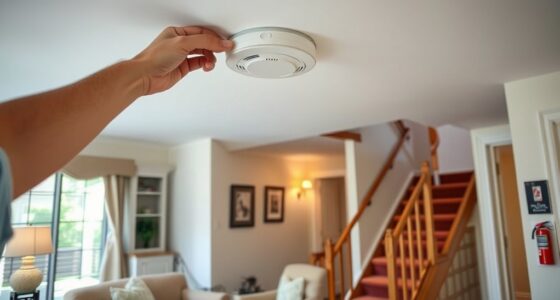Recognizing caregiver burnout signs early is key to preventing worse health issues. You might feel emotionally drained, irritable, or detached, with small tasks feeling overwhelming. Physical fatigue is common, like waking up tired and experiencing heaviness or aches. Stress can also cause headaches or gastrointestinal issues. These signs often happen together, creating a cycle that affects your well-being and ability to care. If you want to understand how to spot these signs sooner, keep exploring further.
Key Takeaways
- Recognize emotional exhaustion like irritability, detachment, and hopelessness as early signs of burnout.
- Watch for physical fatigue such as persistent tiredness, muscle aches, and sleep disturbances.
- Monitor physical symptoms like headaches, gastrointestinal issues, and muscle pain that indicate stress impact.
- Understand that emotional and physical exhaustion often occur together, creating a cycle that worsens overall health.
- Prioritize self-care, set boundaries, and seek support to prevent burnout and maintain well-being.
Recognizing Early Signs of Caregiver Burnout

Have you ever felt overwhelmed or exhausted even after a full night’s sleep? That persistent sense of tiredness can be a warning sign of caregiver burnout. When you’re caring for someone else, it’s easy to overlook your own needs, but recognizing the signs early can make a big difference. One of the first indicators is emotional exhaustion. You might feel drained, irritable, or detached, finding it hard to summon the same patience or compassion you once had. Even small tasks can seem overwhelming, and you may notice a sense of hopelessness creeping in. This emotional fatigue isn’t just about feeling tired; it’s a deep-seated depletion that affects your mental well-being and can lead to feelings of frustration or sadness. Alongside emotional exhaustion, physical fatigue is equally telling. You might wake up feeling just as tired as when you went to bed, or feel a constant heaviness in your limbs. Your body isn’t recovering from the daily demands, and this persistent physical tiredness can make it harder to stay active, alert, or engaged. You might notice that you’re skipping meals, neglecting exercise, or having trouble sleeping, which only worsens your physical state. It’s common to push through these feelings, thinking it’s temporary, but they tend to intensify if ignored. Caregiver burnout can cause your energy levels to plummet, making everything feel like an uphill battle. You might also experience frequent headaches, muscle aches, or gastrointestinal issues, all of which signal that your body is under stress. Recognizing these signs early is crucial because they often coexist and feed into each other, creating a cycle of exhaustion. When emotional fatigue and physical fatigue set in, your ability to provide quality care diminishes, and your own health suffers. It’s easy to justify neglecting your needs, but doing so can lead to more serious health problems down the line. If you start feeling overwhelmed, detached, or physically drained, it’s time to step back and evaluate your situation. Taking breaks, seeking support, and setting boundaries can help you regain balance. Remember, caring for yourself isn’t a luxury; it’s a necessity. By acknowledging these early signs of burnout, you can take proactive steps to protect your mental and physical health, ensuring you can continue providing care without sacrificing your well-being.
Frequently Asked Questions
How Can Caregivers Prevent Burnout Before It Starts?
To prevent burnout, prioritize self-care routines and stress management techniques daily. Make time for activities that recharge you, like exercise, hobbies, or relaxation practices. Set boundaries to avoid overcommitting and ask for help when needed. Regularly check in with yourself to recognize early signs of stress. By actively caring for your well-being, you can maintain your resilience and provide better care without risking burnout.
Are There Specific Age Groups More Prone to Burnout?
Like a fragile glass, certain age groups face sharper cracks from age-related stress and lifespan challenges. Younger caregivers often juggle responsibilities, feeling the weight of future worries, while older caregivers might battle physical exhaustion and emotional strain. Middle-aged caregivers may feel caught in a storm of constant demands. Each phase carries unique stressors, making some age groups more prone to burnout, but awareness helps you navigate these turbulent waters.
What Role Does Support From Family Play in Burnout Prevention?
Family involvement and emotional support play a vital role in preventing burnout. When your family actively participates, it eases your caregiving burden, providing relief and shared responsibility. Emotional support from loved ones helps you cope with stress, boosts your resilience, and keeps you motivated. By fostering open communication and seeking help from family members, you create a stronger support network that safeguards your well-being and reduces the risk of burnout.
Can Caregiver Burnout Affect Physical Health?
Caregiver burnout can indeed take a toll on your physical health, often sneaking up with subtle signs. You might notice physical symptoms like fatigue, headaches, or muscle tension, but the emotional impact runs deeper, affecting your overall well-being. Ignoring these signs can lead to serious health issues. Stay alert to your body’s signals, and don’t hesitate to seek help before burnout spirals into lasting physical or emotional damage.
How Long Does It Typically Take to Recover From Burnout?
Recovery from burnout varies, but it generally takes several weeks to months with effective stress management. You’ll need to prioritize emotional exhaustion recovery by taking breaks, seeking support, and practicing self-care. It’s important to recognize that healing isn’t instant; consistent efforts to reduce stress and recharge are key. Stay patient and committed to your well-being, and over time, you’ll regain your strength and emotional resilience.
Conclusion
By now, you can spot the early signs of caregiver burnout and take steps to protect your well-being. Remember, caring for others shouldn’t come at the expense of your health. Are you giving yourself permission to prioritize self-care as much as your loved one? Recognizing these signs is the first step toward maintaining balance and compassion. Don’t wait until exhaustion takes over—your health matters just as much as theirs.









